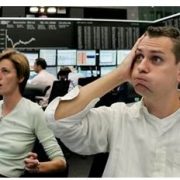Beware the Coming Equity Famine
The world is about to suffer an acute shortage of equity capital over the next eight years, which could total $12.3 trillion. That is the conclusion of the McKinsey Global Institute, an affiliate of McKinsey &Co., a great well of long-term economic thinking which I have been drawing from for the last 40 years.
The cause of the coming debacle is quite simple. Investable assets in the emerging world with minimal experience in equity investment are growing four times faster than those in the developed world. While developed countries own 80% of the world?s $196 trillion in assets today, that share is expected to decline to 64% by 2020.
This means that, by far, the greatest growth in assets will be in countries where managers have the least experience in equity investment.
Aging populations wind down equity investment as they get older, shifting an ever-larger share of their assets into bonds and cash. The rise of defined contribution plans shifts a greater focus on fixed income investments.
More money is going into hedge funds and private equities. The regulatory burden of Dodd-Frank is scaring many banks out of the stock brokerage into safer managed alternatives. When stocks aren?t being ?sold?, no one buys them.
Anyone who has ever tried to sell equities to emerging market investors, like myself, can tell you the challenges they run up against. Much of the region?s assets are controlled by quasi-governmental institutions with a much greater debt orientation.
Equity issuance is very expensive and tightly regulated. Corporate transparency and government oversight is a joke. No one believes the figures that are coming out of China.
Minority shareholders have no say and few rights, with annual meetings often over in an hour. There also is a long cultural tradition of keeping your wealth tied up in gold and silver instead of paper assets. No surprise then, that most emerging market investors view equities as riskier and more speculative than they are in the West and would rather keep their money elsewhere.
A long-term shortage of equity capital will force companies to use more leverage, which will create greater volatility in earnings and share prices. A smaller equity cushion will lead to a higher frequency of bankruptcies during hard times.
High growth companies, such as in technology, will have a particularly hard time raising capital, and IPO markets could dry up from the lack of money.
The net result of these anti-equity trends is that yields will have to rise substantially to become more competitive with bonds. Companies can achieve this by either raising dividends or buying back shares. This, they seem to be doing in spades these days.
This may be the reason behind soaring dividend yields globally over the last several years. The price of admission for equity capital hungry corporations is going up, big time. The $1 trillion plus equity requirements of troubled European banks only exacerbate this situation.
The only way around this crisis is for investment banks to greatly step up their marketing efforts in the emerging markets, especially in China. The Middle Kingdom?s investable assets are expected to soar 328% from $19.8 trillion to $65 trillion by 2020.
That will make it one of the world?s largest markets for investment products in a very short time. Major firms, like Morgan Stanley, Goldman Sachs, JP Morgan, Sogen and UBS have already made massive investments in the region to boost business there.
To read the McKinsey piece in full, please click here.
Better start learning Mandarin if you want to stay in the brokerage business.






